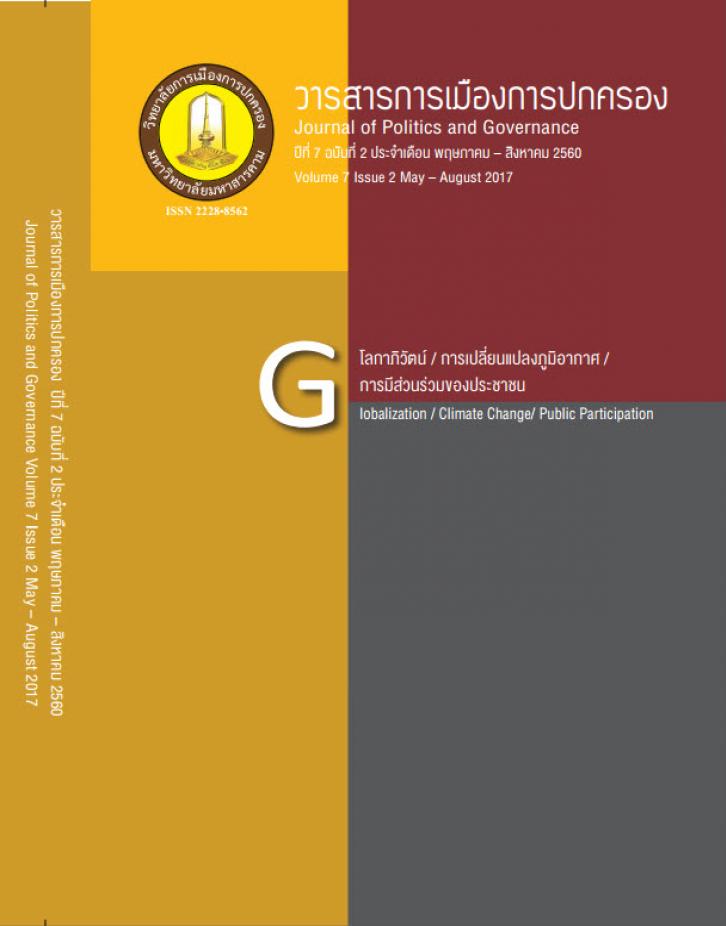Factor Analysis on Strengthening Active Citizenship in Democratic in Nan Province
Main Article Content
Abstract
The objectives of this research were to study knowledge, understanding and confirmatory factors of strengthening awareness of democratic citizenship of the population in Nan Province. The researchers used the sample in a total of 420 people and accidental sampling for randomly selecting the population. The questionnaire was used as an research instrument. The data was analyzed by using frequency, percentage, mean, standard deviation and factor analysis. The findings indicated that the population in Nan Province had knowledge and understanding in awareness of democratic citizenship at a low level (Mean = 12.00). The study of confirmatory factors of strengthening awareness of democratic citizenship of the population in Nan Province found that Kaiser – Meyer - Olkin Measure of Sampling Adequacy (KMO) was equal to 0.957. This indicated that all the data and variables in this study had a good relationship that can be used for analysis of the factors. In addition, the Bartlett's Test was equal to 36940.688 with a statistical significance level of 0.001. This indicated that the correlation matrix of the variables used in this study was interrelated.Suggestions for this research: The relevance agencies or organizations should pay attention to developing knowledge and understanding in acceptance of differences and consideration of social equality with independence and self-reliance as citizens who are aware in an individual level. Also, they should be able to develop the world's political stage with independence and self-reliance as citizens who are living in the community. Moreover, this test can be repeated again in order to find out the areas which have the complete factors of strengthening awareness of democratic citizenship, other areas in Northern Provinces, or other areas with similar contexts to Nan Province to be used as a primary information for strengthening awareness of democratic citizenship at all levels.
Article Details
References
นงลักษณ์ วิรัชชัย. (2542). การวิเคราะห์อภิมาน. กรุงเทพฯ: คณะครุศาสตร์ จุฬาลงกรณ์มหาวิทยาลัย.
ฤๅชุตา เทพยากุล. (2554). การศึกษาวิชาความเป็นพลเมือง (Citizenship Education). วารสารเรียนรู้ประชาธิปไตย. 3(9), มกราคม – มีนาคม.
วลัยพร รัตนเศรษฐ. (2557). รัฐประศาสนศาสตร์พลเมือง. กรุงเทพฯ: มหาวิทยาลัยธุรกิจบัณฑิตย์.
สมพร ใช้บางยาง. (2546, 13 กุมภาพันธ์). บทความพิเศษ พลังพลเมืองร่วมสร้างประเทศไทยให้น่าอยู่. ไทยโพสต์ .
สำนักงานเลขาธิการสภาการศึกษา. (2548). มาตรฐานการศึกษาของชาติ. กรุงเทพฯ.
เอนก เหล่าธรรมทัศน์. (2543). การเมืองของพลเมืองสู่สหัสวรรษใหม่. กรุงเทพฯ: โครงการจัดพิมพ์คบไฟ.
Nosko, A. & Széger, K. (2013). Active Citizenship Can Change Your Country For the Better. [Online] Assess At https://www.opensocietyfoundations.org/voices/active-citizenship-can-change-your-country-better
PWC. (2013). PwC’s NextGen: A global generational study. [Online] Assess At http://www.pwc.com/en _GX/gx/hr-management-services/pdf/pwc-nextgen-study-2013.pdf.
Yamane, T. (1973). Statistic: An Introductory Analysis. (3rd.ed). NY: Harper and Row Publication.


